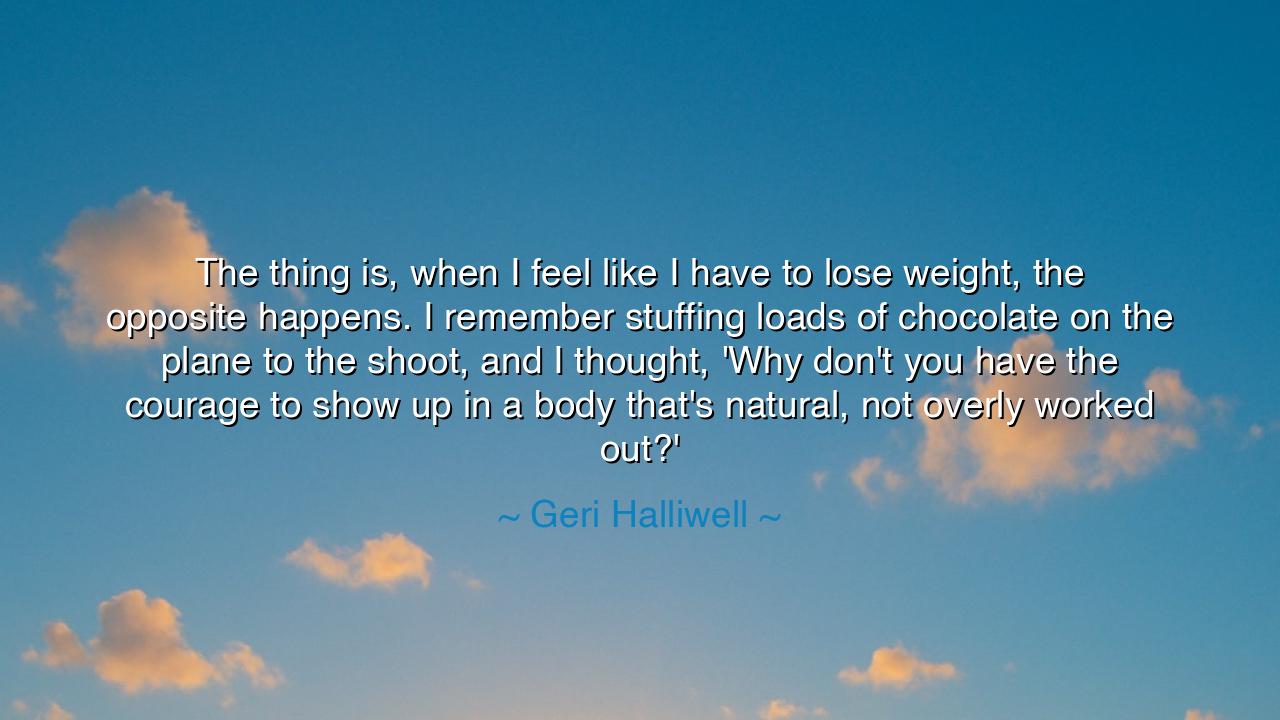
The thing is, when I feel like I have to lose weight, the
The thing is, when I feel like I have to lose weight, the opposite happens. I remember stuffing loads of chocolate on the plane to the shoot, and I thought, 'Why don't you have the courage to show up in a body that's natural, not overly worked out?'






“The thing is, when I feel like I have to lose weight, the opposite happens. I remember stuffing loads of chocolate on the plane to the shoot, and I thought, ‘Why don’t you have the courage to show up in a body that’s natural, not overly worked out?’” Thus spoke Geri Halliwell, once known to the world as Ginger Spice, the fiery spirit of a generation that celebrated freedom, individuality, and joy. In these words, however, she reveals something deeper than glamour or fame — a truth that all who struggle with self-worth must one day confront. Her confession is not about weight, nor about indulgence, but about courage — the courage to be authentic, to stand before the world unmasked, and to accept one’s humanity in its truest form.
The origin of this reflection lies in Halliwell’s own journey through fame, image, and identity. As a global pop icon in the 1990s, she lived under the unrelenting gaze of millions. The world celebrated her as confident and bold, yet behind the bright costumes and powerful performances, she battled the quiet torment familiar to many — the pressure to meet an impossible ideal of perfection. Her body became a battleground between expectation and reality, discipline and desire. And in that moment of self-honesty, as she sat on the plane surrounded by chocolate and self-doubt, she reached a revelation that echoes through the ages: true courage is not sculpting oneself to fit the world’s image, but daring to appear as one truly is.
In her words, Geri Halliwell touches upon a timeless struggle — the human desire to be accepted, even at the cost of authenticity. Throughout history, men and women have sought to change themselves to gain approval, believing that worth is earned through conformity. Yet the wise of every age have warned that peace cannot be found in pretense. The philosopher Socrates declared, “Know thyself,” not as a command of intellect, but of liberation — for to know oneself is to cease the endless striving to be someone else. And so Halliwell’s question — “Why don’t you have the courage to show up as natural?” — is a challenge not only to herself, but to us all.
Consider the story of Eleanor Roosevelt, who, though born into privilege, spent much of her early life feeling awkward, unattractive, and unworthy. Yet through the fires of adversity, she found the strength to stand before the world as she was — plain of appearance but mighty in spirit. She spoke for justice, for compassion, for the voiceless, and became one of the most admired women of the twentieth century. She once said, “No one can make you feel inferior without your consent.” Like Halliwell, she discovered that self-acceptance is the root of power — that to embrace one’s imperfections is to transcend them.
When Halliwell speaks of chocolate and control, she is describing the tension between repression and release that haunts the modern soul. We are told to shape, refine, and discipline ourselves into an image that others will applaud — yet in doing so, we lose the warmth and vitality that make us human. The body, like the soul, resists captivity. When we try to silence it through guilt or self-denial, it rebels. But when we honor it — feed it, rest it, accept it — it becomes an ally rather than an adversary. Her realization on that plane, therefore, is not one of weakness but of awakening: the discovery that freedom begins where self-judgment ends.
Courage, in its truest form, is not the absence of fear, but the willingness to face it. It is to look at the mirror and say, “I am enough,” even when the world whispers otherwise. To appear “natural,” as Halliwell says, is an act of quiet rebellion in a culture that worships artifice. It is a return to the sacred truth that the divine does not make mistakes — that each of us, with our scars and softness, our hunger and heart, is exactly as we are meant to be. The ancients would call this harmony between the outer and inner self eudaimonia — the flourishing of a life lived in truth.
Therefore, my children, learn from this wisdom: do not chase perfection; seek wholeness. Do not measure your worth by the eyes of others, for they, too, are lost in their own illusions. Instead, turn inward. Learn to speak kindly to your reflection, to honor the body that carries you, to nourish it without shame. Every time you choose acceptance over anxiety, honesty over pretense, you perform an act of courage far greater than any conquest.
And so, as Geri Halliwell teaches, the greatest strength is not in sculpting the body, but in softening the heart — not in hiding one’s flaws, but in embracing them as part of one’s story. The world will always try to tell you what you should be, but the soul’s only task is to become what it already is. Walk, then, in your natural truth. For to stand unpolished and unafraid before the gaze of others — that is the purest, and most beautiful, act of courage.






AAdministratorAdministrator
Welcome, honored guests. Please leave a comment, we will respond soon